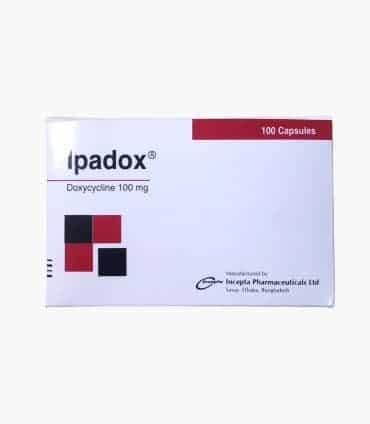Ipadox | 100 mg | Capsule | 10 pcs
৳ 21.50
Brand Name: Ipadox Capsule
Generic: Doxycycline Hydrochloride
100 mg
Manufacturer: Incepta Pharmaceuticals Ltd.
Unit Price: ৳ 2.15 (10 x 10: ৳ 215.00)
Indications
Doxycycline Hydrochloride is indicated in the following infections caused by susceptible microorganisms :
- Pneumonia and other respiratory tract infections caused by Klebsiella, Pneumococci and Mycoplasma pneumoniae
- Gastrointestinal infections
- Genitourinary tract infections
- Soft tissue infections
- Ophthalmic infections (trachoma) caused by Chlamydia trachomatis
- Acne
- Prophylaxis of Plasmodium falciparum malaria
- Miscellaneous group of infections : Prostatitis, Psittacosis, Trigonitis, Louse borne typhus, Plague etc.
Therapeutic Class
Description
Doxycycline Hydrochloride is a semisynthetic tetracycline antibiotic with broad spectrum activity. It is primarily a bacteriostatic antibiotic. It has a similar spectrum of activity to other tetracyclines but in particular is more active against Staphylococcus aureus and Nocardia. The drug is often active against penicillin-resistant strains of Staphylococcus aureus and against strains of those organisms that are resistant to other Tetracyclines. Certain Gram-negative strains of E. coli, Proteus mirabilis and Klebsiella, which are often resistant to Tetracycline, may be sensitive to Doxycycline.
In addition, 70-90% of the various anaerobes are sensitive to Doxycycline and Bacteroides fragilis is more likely to be sensitive to Doxycycline than to other tetracyclines. Doxycycline is active against most strains of Haemophilus influenzae and is particularly useful for infections with H. ducreyi, Actinomyces, Brucella and Vibrio cholerae. It is also active against Nocardia, Chlamydia, Mycoplasma and a wide range of Rickettsiae. Doxycycline is active against spirochetes such as Borellia recurrentis, Treponema pallidum and Treponema pertenue. It is also active against Plasmodium falciparum.
Pharmacology
Dosage & Administration
Severe infections (including refractory urinary tract infections): 200 mg daily for 10 days.
Acne: 100 mg daily.
Uncomplicated genital chlamydia, non-gonococcal urethritis: 100 mg twice daily for 7-21 days (14-21 days in pelvic inflammatory disease).
Interaction
Contraindications
Side Effects
Pregnancy & Lactation
Pregnancy: Doxycycline should be avoided in pregnant women, because of the risk of both staining and effect on bone growth in the foetus.
Lactation: Doxycyclines enter breast milk, and mothers taking these drugs should not breastfeed their child.
Precautions & Warnings
Use in Special Populations
Neonates and children: Doxycycline may cause permanent discoloration of the teeth and so is contraindicated for neonates and children under 12 years.
Elderly: No special precautions are necessary in the elderly.
Storage Conditions
| Generic Name | Doxycycline Hydrochloride |
|---|---|
| Size | 100 mg |
Only logged in customers who have purchased this product may leave a review.











Reviews
There are no reviews yet.